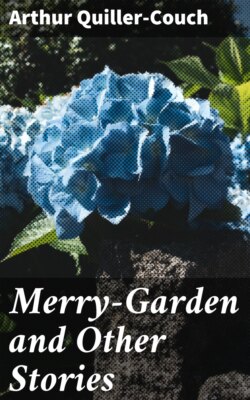Читать книгу Merry-Garden and Other Stories - Arthur Quiller-Couch - Страница 7
На сайте Литреса книга снята с продажи.
III.
ОглавлениеTable of Contents
Nandy kept his word.
Breakfast next morning was no sooner over than he made a bolt across the pleasure-grounds, crept through the hedge at the bottom, and went singing down the woods towards Merry-Garden, with his heart half-lovesick and half-gleeful, and with two thick sandwiches of bread-and-butter in his pocket to provide against accidents. But he didn't feel altogether easy at the thought of facing Aunt Barbree: and by and by, drawing near to the house and catching sight of his aunt's sun-bonnet up among the raspberry-canes, he decided (as they say) to play for safety. So, creeping down to the front door, he slipped under it a letter which he had spent a solid hour last night in composing; and made his way to the foreshore, to loaf and smoke a pipe of stolen tobacco and, generally speaking, make the most of his holiday. The note said—
"Dear Aunt—Do not weep for me. The sulphur-water made me sick and I could stand it no longer. So am gone for a Soger. Letters and remittances will doubtless find me if addressed to the Citadel, Plymouth. A loving heart is what I hunger for—Your affect, nephew,
Ferdinando Jewell."
"P.S.—On 2nd thoughts I may be able to come back this evening to say farewell for ever."
"P.S.—Don't sit up."
Now a boy may be a lazy good-for-nothing, and yet (if you'll understand me) be missed from a garden where there are ladders to fix and mazzard cherries to pick; and likewise, though liable to be grumbled at, a boy has his uses in the gathering of cockles. Though she knew him to be an anointed young humbug, there's no denying that Aunt Barbree had missed Nandy and his help. She was getting past fifty, and somehow the last ten days had reminded her of it. … The long and short of it was that, after a couple of hours fruit-picking—and it took her no less to get together the supply she'd reckoned on for her afternoon customers—she entered the house with a feeling of stiffness in her back and a feeling that answered to it elsewhere, that maybe Nandy was a better boy than she'd given him credit for. Upon top of this feeling she pushed open the door and spied his letter lying on the mat.
The reading of it turned her hot and cold. She marched straight to the dairy, where Susannah was busy with the cream-pans, and says she, loosening her bonnet-strings as she dropped upon a bench, "He was but an orphan, after all, Susannah: and now we've driven 'en to desperation!"
"Who's been driven to desperation?" asked Susannah.
"Why, Nandy," answered Aunt Barbree, tears brimming her eyes. "Who elst?"
"Piggywig's tail!" said Susannah. "What new yarn has the cheeld been tellin'?"
"He's my own nephew, and a Furnace upon his mother's side," said Aunt Barbree; "and I'll trouble you to speak more respectful of your employer's kin. And he hasn't been tellin' it; he've written it, here in pen and ink. He've cut and run to take the King's shilling and be a sojer: and if I can't overtake him before he gets to Plymouth Citadel the deed will he done, and the Frenchies will knock him upon the head and I shall be without a roof to cover me. Get me my shawl and bonnet."
"You baint goin' to tell me," said Susannah, "that you act'lly mean to take and trapse to Plymouth in all this heat?"
"I do," said Barbree. "Get me my shawl and bonnet."
"What, on a Saturday afternoon! And me left single-handed to tend the customers!"
"Drat the customers!" said Aunt Barbree. "And drat everything, includin' the boy, if you like! But fetch to Plymouth I must and will. So, for the third time of askin', get me my shawl and bonnet."
It cost a mort of coaxing even to persuade her to a bite of dinner before setting forth. By half-past noon she was dressed and ready, and took the road toward Saltash Ferry. Nandy didn't see her start. He was lying stretched, just then, under the cliff by the foreshore, getting rid of the effects of his pipe of tobacco.
It left him so exhausted that, when the worst was over, he rolled on his stomach on the warm stones of the foreshore and fell into a doze; by consequence of which he knew nothing more till the tide crept up and wetted his ankles; and with that he heard voices—uproarious voices on the water—and sat up to see a boatload of people pass by him and draw to the landing-stage under Merry-Garden.
Nandy rubbed his eyes, studied the visitors—that is, as well as he could at fifty yards' distance—and chuckled. He knew that his aunt was a respectable woman, and particular about the folks she admitted to her gardens. But it was too late to interfere—even if he'd wanted to interfere, which he didn't. So he watched the visitors draw to land and disembark; and sat and waited, still chuckling.
